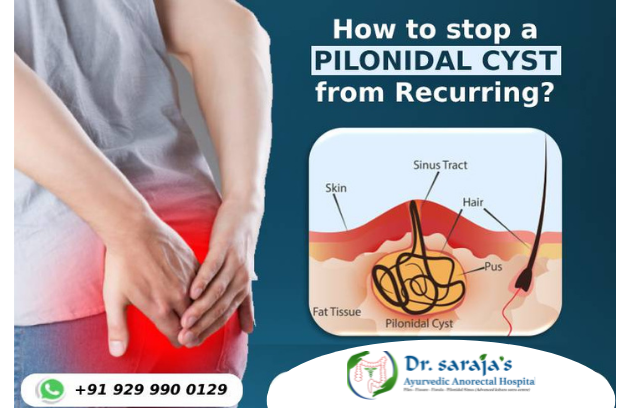What is Pilonidal Cyst
A pilonidal cyst is a form of cyst that develops in the buttocks. These are a spherical sac of tissues filled with air that develops because of a skin infection. Ingrown hairs are common inside these cysts, which are typically caused by a skin infection.
Who is at risk for a pilonidal cyst?
- Males (men are three to four times more likely to be diagnosed with a pilonidal cyst than women)
- People between the ages of puberty and 40.
- Employees who spend their days sitting
- People who are overweight
- Those who have thick or coarse body hair
- Tight-clothed individuals
Many patients go through treatment for pilonidal sinus and the cysts never return. However, around 20% of patients have a recurrence during the first six months of therapy, and up to 20 years afterwards. A pilonidal cyst is a painful ailment that occurs when an aberrant epithelial channel forms right above the buttocks (near the natal cleft). The pilonidal cyst has a proclivity for recurrence. As a result, if a person has a pilonidal cyst, they are more likely to develop one in the future.
Between six months and four years following cure, a true recurrence generally manifests as symptoms. They are usually triggered by the same factors that caused the initial cyst to form. Returning pilonidal cysts form in the same way as first cysts do, therefore this might be due to a lack of adequate cleanliness.
Here are some tips to help you avoid another cyst or recurrence of the first cyst infection:
- Frequent Hair Removal from Affected Area: As much as possible, try to maintain the region hair-free. If you are prone to pilonidal cysts, it is recommended that you remove any hair from the sacral region. Ingrown hairs and loose hairs will not be able to penetrate the skin again because of this.
- Hygiene of Pilonidal cyst prone area: Maintaining appropriate cleanliness can significantly reduce the chances of a Pilonidal cyst recurrence. Every day, wash the area with a gentle soap, ensure that the soap is completely washed. After washing, instead of rubbing the skin dry vigorously, softly pat it dry.
- Avoid Sitting for Long Hours: Sitting for long periods of time increases your risk of having a pilonidal cyst. Sweat and dirt can build in the natal cleft because of this perspiration and grime, the cyst is more likely to return around the buttocks. As a result, you must ensure that you adjust to a more active lifestyle.
- Maintain A Healthy Weight: The chance of recurrence of the pilonidal cyst is increased by excess body weight. It puts more pressure on the hips, which aids the pilonidal cyst develop. Furthermore, if you live a sedentary lifestyle, you will increase your risk of pilonidal cyst recurrence.
- Regular Check-up: On a regular basis, check the cyst-affected region for any lumps or pain. Look for any lumps or redness in the region surrounding the first pilonidal cyst.
If you see any signs that you’re developing a pilonidal cyst again, visit your doctor right once to prevent another cyst from growing.
If you see the symptoms of a pilonidal cyst recur, get medical help as soon as possible. This will also assist you to figure out what else may be causing the recurrence.
We are the best hospital for pilonidal sinus treatment in Hyderabad offering the best doctor for pilonidal in Hyderabad at affordable prices. We have extensive experience in providing customized ayurvedic treatments In Saraja Ayurveda Clinic, we treat pilonidal cyst and pilonidal sinus treatment, as it is a hospital based pilonidal sinus treatment performed under local anaesthesia. Post pilonidal cyst treatment in Hyderabad you will be addressed ayurvedic medicated oils. Patients can resume their day-to-day activities from the next day itself. We cure pilonidal cyst without any complications or recurrence.

